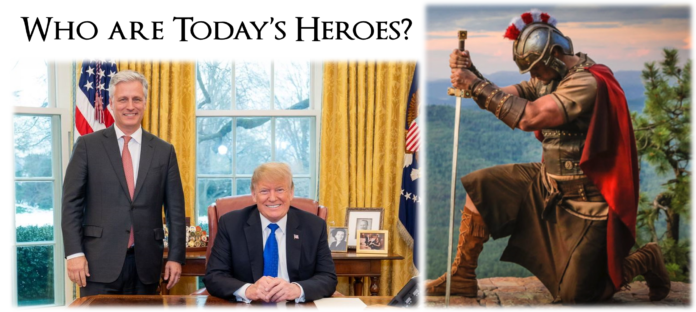In this atmosphere of highly political debate we often focus more on our differences than what we share in common. The Lord Jesus Christ! I am a very strong Conservative similar to the vast majority of you who follow this blog.
I believe in our Country, the wonderful military who protect us, and those in the government that are willing to follow God and not Man. The purpose of this blog is to honor our military and those in our government that make me proud and responsible to be an American in this Land of Promise. I acknowledge all those who fight for us as Captain Moroni did. We are fighting for our family, our spouses and our children to maintain our personal freedom as spoken about in the Book of Mormon.
Only since Ronald Reagan can I remember a President of the United States who has fought for our freedom as has President Trump. Before you get too opinionated or judgmental here’s where I come from. Growing up I loved baseball and loved rooting for Babe Ruth, Willie Mays and Mickey Mantle. I didn’t love them because they were my bishop or because they set a good example for me, but I loved them because they were great baseball players. That’s how I see Pres. Trump. He’s an amazing go-getter, non-political, a get things done man, and one who loves conservative principles and hates liberal causes. I judge him on his results that have been awesome for my family and our country. I love his support of Israel as well.
I am excited to have just learned that Trump’s new Security Advisor is a fellow Latter-day Saint, Robert O’Brien. I have been watching him and I like what I see so far. I can’t say the same about Mitt Romney who greatly disappoints me as one who does not represent the majority of values in government that I do. Though he is a fellow Latter-day Saint, I am at times very saddened by his positions. Even then, I pray for our government to do the right things as you do. I sincerely believe there are only a very small percentage of politicians who love the Lord and do His will. Most have become caught up in power and greed.
I feel no need to fear, and I have a great faith that all will be well if we stay close to the Lord. Many people fear death as the worst thing that can happen in life. I don’t. I believe the worst thing that can happen is we choose a spiritual death of not believing and following the Savior. Death is part of life, so live life to it’s fullest within the bounds our Father in Heaven has set. That’s how we can honor Him and our military and our country. I don’t think our wonderful missionaries get enough credit either. I pray for them and honor them as they are all heroes to me as well. I love President Nelson and all the General Authorities and know as we follow them we will be blessed. Christ lives and I love Him.
Friends say new LDS national security adviser has skills to work with Trump
Robert C. O’Brien praises Trump but will tell president what he needs to hear, former law partner says By Matthew Brown@mbrownreport Sep 18, 2019
/cdn.vox-cdn.com/uploads/chorus_image/image/65273925/AP_19261636212797.0.jpg)
WASHINGTON — To those who know him, Robert C. O’Brien, the administration’s newest national security adviser, is an ideal choice for the job.
Characterized in national media as an affable, sharp, team player and a tough negotiator, O’Brien is described by those who know him as warm, engaging, receptive, focused and a man of faith.
Raised Catholic and a convert to The Church of Jesus Christ of Latter-day Saints, he will be the highest ranking Latter-day Saint in the U.S. government.
“He is particularly adept at listening to other people, weighing differing opinions and not imposing his own views,” says Sen. Mitt Romney, who has known O’Brien for more than 15 years and sought O’Brien’s insights on military policy during his 2008 and 2012 presidential campaigns.
O’Brien, 53, will be Trump’s fourth national security adviser and was seen as a “safe option.” His management style will be a marked contrast to his predecessor, John Bolton, whom Trump sacked last week after disagreements over the administration’s approach to Iran, Afghanistan and other global challenges.
At the time of his appointment, O’Brien was the administration’s chief hostage negotiator. He worked closely with the families of American hostages and advised administration officials on hostage issues. He helped secure the release of Andrew Brunson, a pastor held by Turkey for two years and Danny Burch, an oil-company engineer kidnapped in Yemen. He also worked on the case of missing U.S. journalist Austin Tice, who was captured in Syria in 2012. O’Brien has said he is confident Tice is still alive, the Associated Press reported.
Earlier this year, Trump dispatched O’Brien to Sweden to keep tabs on the criminal case there against rapper A$AP Rocky, whom a judge and jury ultimately found guilty of assault in August, several weeks after a street brawl in Stockholm that attracted Trump’s attention.
“He’s worked with me for quite awhile now on hostages and we have a tremendous track record on hostages,” Trump said Wednesday on a tarmac in Los Angeles, hours after revealing the pick on Twitter. “Robert has been fantastic. We know each other well.”
O’Brien, standing alongside Trump, said it was a “privilege” to be picked, the Associated Press reported.
“We’ve got a number of challenges,” he said, adding that the administration’s focus will continue to be on keeping the U.S. safe and rebuilding the military. He said he would advise Trump privately on the situation in Saudi Arabia, where oil facilities were attacked recently by weapons from Iran.
The New York Times reported that O’Brien’s first test as national security adviser may be Iran. Trump has suggested both military action against and negotiations with Iran. On Wednesday, he talked about an economic response.
Romney — who chairs the Foreign Relations Subcommittee on Near East, South Asia, Central Asia and Counterterrorism — called O’Brien “a clear eyed realist. He harbors no prejudice, but he also is very understanding of the maligned intent of nations that are building a military threat.”
Sen. Mike Lee, R-Utah, said he worked with O’Brien when O’Brien was with the State Department.
“He is an incredible champion of religious freedom around the globe and I am confident that he will excel in his role as national security adviser to the president,” Lee said in a statement.
O’Brien has also lent his expertise in international relations to his church, said Matt Ball, public affairs director of the North America West Area of The Church of Jesus Christ of Latter-day Saints.
Ball said he has often relied on O’Brien to help connect the church with foreign diplomats stationed in California to facilitate humanitarian efforts overseas.
“In our experience, he has always been a man who does not tout his contacts or his influence, and yet we never cease to be amazed at the amount of contacts and influencers with whom he has a connection, which is always a wonderful surprise because he’s extremely willing to help,” Ball said.
He recalled a symposium of political pundits during the 2016 election where O’Brien was the only one who predicted Trump would win. Before Trump took office, O’Brien praised him in a column in The National Interest for telling allies to pay their share of the common international defense.
“We may be witnessing the most impressive presidential transition from a national-security standpoint in history,” O’Brien wrote.
He also effusively gave credit to Trump for the hostage releases, which the president cited in calling himself “the greatest hostage negotiator in history.”

But O’Brien has the skills to tell the president what he may not want to hear, said Stephen Larson, who has known O’Brien more than 20 years and co-founded Larson O’Brien LLP, a law firm that focuses on litigation and international arbitration issues, in Los Angeles.
“Good lawyers are very used to telling clients what they need to hear, not what they want to hear, so that’s something that will come natural to Robert,” Lawson said. “By nature, he’s not confrontational, but he never shied away from advising whoever it is on what they need to hear.”
O’Brien has a law degree from the University of California, Berkeley. Before establishing his firm with Lawson in 2016, O’Brien was the California managing partner of the Washington, D.C.-based Arent Fox.
“He brings with him some unique talents the average person doesn’t have,” said Mike Grow, an attorney with Arent Fox. “He is very focused and has a lot of tenacity and drive to get something done. But he’s very receptive to ideas, not at all dogmatic and has a very practical approach to problems.”
O’Brien’s biography on his firm’s website notes a long resume of public service under the George W. Bush and Barack Obama administrations.
He was the U.S. alternate representative to the United Nations General Assembly from 2005 through 2006, when Bolton was U.S. ambassador to the U.N. In 2008, O’Brien served a three-year term on a government committee that advises on the trafficking of antiquities and other cultural items. He was the founding co-chairman of the Department of State Public-Private Partnership for Justice Reform in Afghanistan from 2007 to 2011 and served under both Condoleezza Rice and Hillary Clinton.
“Earlier in his career, O’Brien was a senior legal officer for the U.N. Security Council commission that decided claims against Iraq that arose from the Gulf War. He was a major in the U.S. Army Reserve,” a State Department biography stated.
5 Facts About National Security Advisor Robert C. O’Brien Video below:
The quiet successor to Trump’s fiery former national security advisor couldn’t be more different. And he wants to stay that way, aides say.
BY LARA SELIGMAN | JANUARY 27, 2020
Robert C. O’Brien: Here’s how I will streamline Trump’s National Security Council
By Robert C. O’Brien Oct. 16, 2019
Robert C. O’Brien is national security adviser.
In the three years since President Trump’s election, the United States has seized the initiative from its adversaries all over the world. We decimated the Islamic State as a military force. The president fulfilled a campaign promise to walk away from the nuclear deal with Iran, a country that was funding terrorism. He restored America’s partnerships with Israel and with Arab governments both to constrain Iran and to protect U.S. interests in the Middle East without drawing the country into another ground war.

The president used a firm hand with Moscow, expelling Russian spies, increasing sanctions, closing Russian consulates and providing arms to Ukraine. With North Korea, he combined maximum economic pressure and military deterrence with a willingness to engage in personal diplomacy to advance peace.
Most important, as outlined in his 2017 National Security Strategy, the president has begun aligning our foreign and national security policies with the principal challenge facing the United States: prolonged peacetime competition with great powers such as China.
Put simply, the president has executed a fundamental shift in U.S. foreign policy to ensure that it recognizes and protects the concrete interests of the American people. As his new national security adviser, I have commenced changes to the National Security Council staff designed to assist the president as he continues to execute his foreign policy vision for the country.
For most of the United States’ history, presidents ran national security and foreign policy by overseeing the State Department, the Navy Department and the War Department. After World War II, defending America in the modern world required new intelligence agencies, the unification of the armed services under a massive new Defense Department, and later the creation of new civilian organizations with some defense functions, such as NASA and the Energy Department.AD
Congress created the National Security Council to assist presidents in managing the complexities of this expansion of the federal government. The 1947 law establishing the NSC, which originally consisted of the president, vice president, and the secretaries of state and defense, stated: “The function of the Council shall be to advise the president with respect to the integration of domestic, foreign, and military policies relating to the national security.”
The word “advise” is fundamentally important. While the statutory members of the NSC, in some cases, run departments that execute foreign policy, the NSC staff at the White House was intended to coordinate policy rather than run it. My job as the national security adviser is to distill and present to the president the views and options that come from the various departments and agencies. The NSC then ensures that those agencies actually execute the president’s decisions. This is the “honest broker” model of the national security adviser, best personified by Brent Scowcroft, who held the post during both the Gerald Ford and George H.W. Bush administrations.
During the Obama administration, the NSC ballooned to well over 200 policy staffers. By comparison, a mere 12 NSC policy staffers helped President John F. Kennedy deal with the Cuban missile crisis in 1962. As President Jimmy Carter handled multiple crises in the late 1970s, the NSC staff totaled just 35 professionals. During the first term of the George W. Bush administration, with two major wars in Iraq and Afghanistan underway, the policy staff was about 100 people.AD
After consulting several of my predecessors and analyzing the NSC’s current configuration, I have determined that the agency can and should be streamlined, and am in the process of restoring the NSC to its historical mission.

With the president’s approval, we will reduce the NSC staff, making it more effective by reaffirming its mission to coordinate policy and ensure policy implementation. The NSC staff should not, as it has in the past, duplicate the work of military officers, diplomats or intelligence officers. With that in mind, we will be able to reduce 174 policy positions to under 120 by early 2020.
We will further combine some functional directorates that duplicate other White House offices, while refocusing our emphasis on the directorates that cover geographic regions, which have traditionally been the heart of the NSC. The international economics team, for example, will now rightly be managed by Larry Kudlow, director of the president’s National Economic Council.AD
To achieve these policy staffing goals, we will eliminate existing vacancies and consolidate duplicative positions. The great majority of the men and women who serve on the NSC staff, most of whom are detailed from other departments and agencies, will complete their standard tour of duty.
Rightsizing the NSC staff reflects the president’s vision for a lean, efficient government that is focused on the core national interests of the United States.
This painting says it all!






